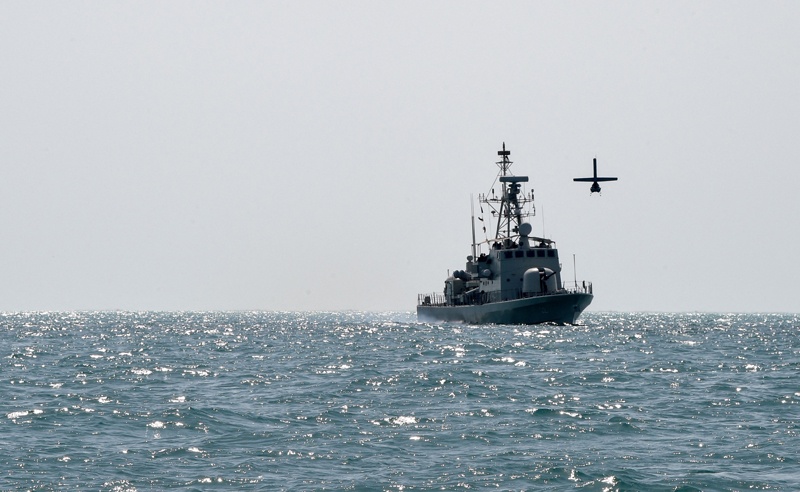 A US Navy Martin UAV drone flies over Gulf waters as Royal Bahrain Naval Force (RBNF) Abdulrahman Al Fadhel takes part in joint naval exercise between the US 5th Fleet Command and Bahraini forces yesterday. – AFP
A US Navy Martin UAV drone flies over Gulf waters as Royal Bahrain Naval Force (RBNF) Abdulrahman Al Fadhel takes part in joint naval exercise between the US 5th Fleet Command and Bahraini forces yesterday. – AFP
MANAMA: The US and Bahrain navies conducted yesterday a joint exercise at sea, launching a series of drills integrating unmanned systems into regional maritime operations. The US Fifth Fleet, based in Bahrain, announced last month it launched a new task force in the Gulf to rapidly incorporate drones and artificial intelligence into operations, saying Task Force 59 would rely on regional and coalition partnerships.
The announcement by the US Naval Forces Central Command (NAVCENT) came amid maritime tensions between Iran and its Zionist archenemy, with which Bahrain normalized ties last year. Since February, Iran and the Zionist entity have been accused of engaging in what analysts have called a "shadow war", in which vessels linked to each nation have come under attack in waters around the Gulf in tit-for-tat exchanges.
In August, Iran rejected Western allegations its drones were used in a deadly tanker attack off the coast of the United Arab Emirates. The Islamic republic accused the Zionist entity of concocting the "scenario" in a bid to undermine it. US Navy spokesman Tim Hawkins said yesterday's drill with Bahrain - dubbed "New Horizon" - was part of efforts to help enhance maritime domain awareness, strengthen deterrence, and foster partnerships.
It marked the first time the US Navy was integrating unmanned surface vessels with manned ships at sea in the Middle East, and the first time with a regional partner testing in Gulf water. "We're putting a couple of unmanned surface vessels called MANTAS T-12 in the water," he told AFP, as two ships from the Royal Bahrain Naval Force stood by. "This will help us understand how we can use these vessels to enhance maritime domain awareness, which is critically important to maintaining regional stability and security."
Bahrain overlooks the Strait of Hormuz - a passage less than 40 km wide at its narrowest point, and where US and Iranian naval vessels have faced off in the past. In February, US President Joe Biden's administration pulled an aircraft carrier out of the Gulf in a sign of potentially easing tensions with Iran, which had soared under former president Donald Trump. - AFP










